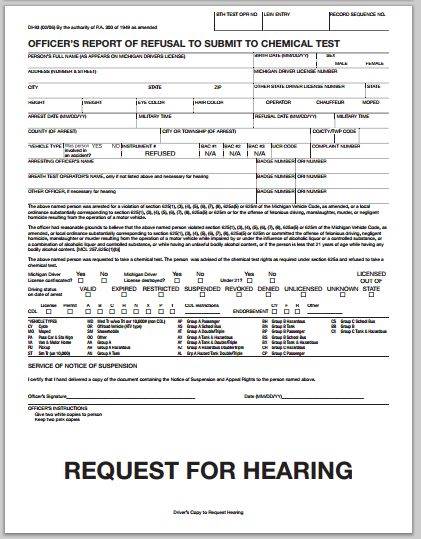Listen to our Implied Consent Podcast:
Quick Summary of Implied Consent
If you refused to take a breath or blood test after you were arrested for a drunk driving offense, you have only 14 days to request a hearing before your license is suspended for one year and 6 points are added to your license. You can be completely sober without a drop of alcohol and still face these harsh sanctions so long as the police officer had probable cause to believe you were guilty of drunk driving. This is because Michigan's "implied consent" law sets forth penalties that are separate from drunk driving sanctions.
 It is important to realize that these penalties are not triggered by a preliminary breath test refusal. A PBT refusal is merely a civil infraction in Michigan, and it carries no points and does not get abstracted to a driver's license. Unless the driver is a minor or a commercial driver, a preliminary breath test refusal is a fine of $100.00 to $200.00.
It is important to realize that these penalties are not triggered by a preliminary breath test refusal. A PBT refusal is merely a civil infraction in Michigan, and it carries no points and does not get abstracted to a driver's license. Unless the driver is a minor or a commercial driver, a preliminary breath test refusal is a fine of $100.00 to $200.00.
If you are uncertain whether you refused, take a look at the paperwork that the police officer issued. Form DI-93 is given to motorists who have refused a chemical test, while Form DI-177 is given to motorists who submitted to chemical testing but provided a breath sample over the legal limit. The form number can be found in the upper left hand corner.
Chemical Test Refusals
Following an arrest for drunk driving, a police officer will request that a motorist submit to a breath, blood or urine test. The officer decides which test to administer under Michigan's implied consent law. If a person unreasonably refuses to submit to a chemical test, the driver faces an implied consent suspension.
The motorist has the right to a hearing at the Secretary of State, but it must be requested within 14 days. If the driver fails to request a hearing, the license is suspended for at least one year, and six points are added to the license. Contested hearings are held before the Driver's License Appeal Division of the Secretary of State.
Successful challenges can be raised at an implied consent hearing. We regularly represent clients at the DLAD, so you should call our office immediately if you refused to submit to a chemical test.
Refusal of a PBT
A PBT is a small handheld device that measures breath alcohol through a fuel cell. It is not admissible in court except in very limited circumstances. After requesting that a motorist perform field sobriety tests, a police officer will likely indicate that there is one more test that they want the driver to perform. The last "field sobriety test" is a PBT.
Even if the motorist already passed all field sobriety tests and the officer cannot honesty say the driver appears to be intoxicated, the PBT results can be used to legally arrest a driver if the results are 0.08 or higher.
Here are photographs of the two PBTs used in the State of Michigan that we own here at our law office:

LifeLoc FC10 (Click for Full Size Image)
The LifeLoc FC10 is a newer device with numerous options but can still produce inaccurate roadside results.

AlcoSensor III (Click for Full Size Image)
The AlcoSensor III has been phased out of service in most areas around Michigan.
Except for commercial drivers, refusing the PBT is only a civil infraction with no points. The fines are only $100.00 to $200.00. You will not lose your license for refusing PBT, and you do not need to request a hearing.
How to recognize an implied consent refusal
The easiest way to determine whether you are charged with a chemical test refusal is to check the temporary driver's license issued by the police department. A DI-177 is issued in almost every drunk driving case, and the motorist does not face an implied consent suspension. A DI-93 is issued when the officer alleges a refusal. Here are the two forms:

DI-177 Consent Form (Click for Full Size Image)
No chemical test refusal is alleged, but, if you refused, you may receive a DI-93 at a later date.

DI-93 Chemical Test Refusal Notice
With the above form, the "DI-93," the officer is alleging that a chemical test refusal occurred. When this form is provided to the motorist, a hearing must be requested within 14 days.